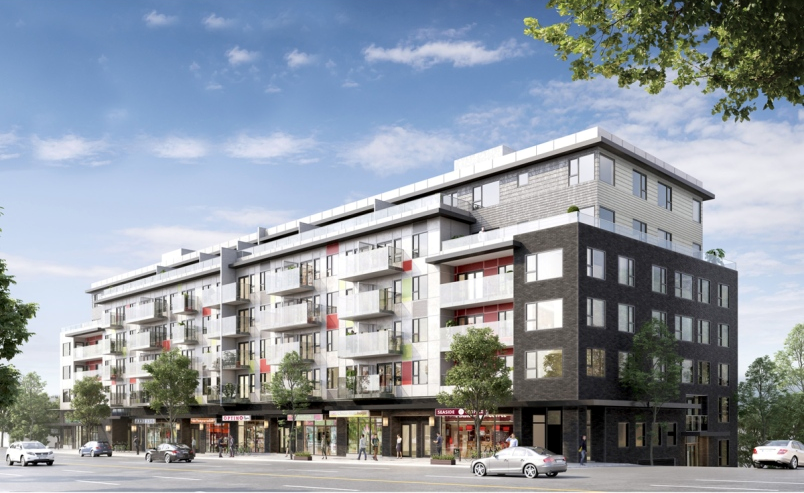The organizations responsible for what was an aging seniors’ rental complex in Renfrew-Collingwood have leveraged the land’s value to get the building replaced at no cost, and no risk, as part of a larger mixed-use development.
Ground broke on the project at 3595 Kingsway, Jan. 26. It will see 44 units from Odd Fellows Manor replaced in a new six-storey building that also features commercial retail space at grade level and 117 market rental units.
The manor, which was built in 1971, was run by Odd Fellows Low Rental Housing Society, which works in conjunction with Three Links Care Society.
Its units were geared toward low-income residents 55 years and older. The building needed either significant repairs or replacement. Replacement was deemed the best option.
In 2012, Odd Fellows society approached Terra Housing to help find a solution. It specializes in developing real estate with social-purpose and market components.
Terra Special Projects, the development arm of Terra Housing, signed an agreement with the society to take on the risk and redevelop the property for the residual density. In return, the society would get their units replaced.
Terra Housing Projects subsequently partnered with Hungerford Properties, which had the capital and capacity to deliver the project. Terra became minority partners and over a two-year period acted as liaison between Hungerford and Odd Fellows. Now that construction has started, Hungerford works directly with Odd Fellows.
The project, which was approved in 2016, falls under the City of Vancouver’s Rental 100 program and is expected to be completed by the summer of 2019.
David Hurford, CEO for Three Links Care Society, said they spent months working with tenants, and organizations such as BC Housing and Vancouver Coastal Health, on relocation plans. The goal was to find displaced residents housing that was as good or better. In some cases, tenants were also matched with other services they needed through the process.
By this point, the building was half empty because once the project was a go, new tenants were no longer accepted at the manor. All of those remaining tenants will have first right to return to units in the new building once it’s finished. Residents in all 44 units will pay below market rents, according to an agreement with the City of Vancouver.
Hurford said these kinds of arrangements, in which a non-profit leverages land, are the wave of the future. Developers, he added, also see they’ll have a better chance of success with their project if they’re working with a non-profit, or public service organization, to create social housing units in markets such as Vancouver where there’s an affordability crunch.
“It appears to me the model people are really looking for is a non-profit working collaboratively with a municipality and a well-regarded private developer,” he said. “That seems to be a nice mix. And then, within the building, some sort of a mix of subsidized units for people who need the extra assistance and some sort of opportunity to offer market rental, which is what the market needs as well.”
Hugh Forster, a principal at Terra Special Projects, said it was a positive move for Odd Fellows manor.
“It’s unique in that a non-profit charitable society without financial resources [is] able to replace their social housing at no risk and no cost. They did that because their property had excess density. We traded them the density for the keys to a new building,” he said. “Our agreement was very complicated from a legal standpoint but it assured them that they had no risk.”
Michael Hungerford, a partner at Hungerford Properties, also sees it as a way a non-profit can creatively unlock land value for their own purpose.
“It’s important because it symbolizes what can be done when a private developer, a not-for-profit and the City of Vancouver come together and deliver a great project for the community that’s going to create a lot of affordable housing, which is desperately needed in our city,” he said.
The need for affordable housing for seniors in Renfrew-Collingwood is reflected in city statistics. Based on the 2011 census, 20 per cent of the population within the Joyce/Vanness study area, which is approximately 700 metres of the SkyTrain station, are aged 55 or older, according to information outlined by city staff at the public hearing when the project was approved. At that time, in 2016, there were about 290 units dedicated to seniors housing in the area, and an additional 400 units in co-ops and non-market housing.
The City of Vancouver doesn’t track whether these types of partnerships are becoming increasingly common but, through its Housing Vancouver Strategy, “supports partners across all sectors to come to the table with new ideas, approaches, and opportunities to address Vancouver’s housing challenges,” city staff say. “This includes partnerships between non-profits and the private sector for affordable housing delivery.”
The city’s housing strategy, in which one of the key objectives is to renew the commitment to partnerships for affordable housing, can be found here.

.png;w=120;h=80;mode=crop)

